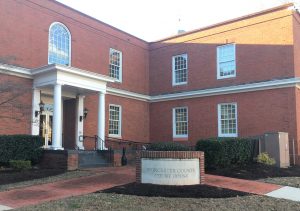
SNOW HILL — State judiciary officials last week re-instituted restrictions on most criminal and civil jury trials across, resulting again in another backlog of cases after the court system was starting to make headway after the spring shutdown.
The Maryland Judiciary last Thursday announced it will restrict operations to Phase III of its five-phased progressive reopening plan in response to the continuing surge in COVID-19 cases in the state. The state’s judicial system virtually shut down in March amid the initial COVID outbreak and was just beginning to return to some sense of normalcy this fall.
The Maryland Judiciary had resumed full operations under Phase V on Oct. 5, including jury trials, with state-mandated health protocols in place statewide, including here on the Lower Shore. With the number of new COVID cases spiking almost daily, along with an increasing positive test rate, Maryland Court of Appeals Chief Judge Mary Ellen Barbera announced the return to Phase III of the recovery plan last Thursday.
“After consultation with the leadership of the Maryland Department of Health and Judiciary leaders, I have determined that the Maryland Judiciary must return to restricted operations as described in Phase III in response to the rapidly increasing number of COVID-19 cases in Maryland,” she said. “The health and safety of the public, judges, and Judiciary staff remains a top priority, and we will continue to monitor the COVID-19 heath emergency and adjust Judiciary operations as necessary. We will keep the public apprised of any changes in operations and ensure that as many of the core functions of the Judiciary will remain available to the extent the emergency conditions allow.”
In Phase III, the district courts and the circuit courts will continue to hear specific cases and other proceedings remotely, but jury trials will not be heard until at least after the end of the year. Courts across Maryland will continue using technology for remote proceedings, either by video or telephone, but the process will vary by court location.
Under Phase III, the types of cases that will continue to be heard include district court criminal, traffic, civil, family, Child in Need of Assistance (CINA) and juvenile matters. The courts, including those in Worcester County, will also include to hear extreme-risk protective orders and landlord-tenant cases.
Closer to home, Worcester County State’s Attorney Kris Heiser said the return to Phase III represents a setback at a time when her office was making progress on cases backlogged since last spring. Perhaps more importantly, many of the criminal cases from the height of the summer season, including a particularly violent stretch in June, were starting to make their way toward jury trials.
“Ultimately, each additional restriction imposed on the court slows down the workings of the entire criminal justice system, meaning already-backlogged cases are now further backlogged,” said Heiser this week. “My prosecutors continue to work diligently on their cases, appear in court for all matters that are still allowed to proceed and to remain prepared for the eventual resumption of jury trials.”
Heiser said a major concern for her team is the number of defendants being held without bond while awaiting trial. With the machinations of the court system, many of the most serious cases from the summer in Ocean City were heading toward jury trials in the coming weeks.
“Our biggest concern and priority continues to be preventing the release of dangerous criminals who are being held pre-trial,” she said. “As is the case throughout the state, defendants who pose a danger to our community and were properly ordered held pending trial will increasingly seek additional bond reviews to argue for their release because, in some cases, the length of time they have been held pre-trial is greater than what it would be under normal circumstances.”
Heiser said through no fault of the court system, many of those offenders could have to wait weeks, or perhaps months, for their trials to come to fruition. In some cases, those defendants could serve time in jail for a period equal to or greater than their ultimate sentences.
“My prosecutors continue to argue against the release of any defendant who poses a danger to our community,” she said. “Unfortunately, the existence of COVID-19 does not make these offenders any less dangerous, and because we are not the reason for the delay in their trials.”
Otherwise, individuals who have business with the courts should check the judiciary’s website at www.mdcourts.gov, or call the clerk’s office in their jurisdiction before arriving at a courthouse location. All court visitors and employees are required to wear a face mask, submit to temperature checks a verbal or written COVID screening questionnaire and adhere to social distancing guidelines.

